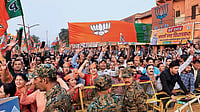A relaxed Sharad Pawar spoke to Outlook while clearing files at his Krishi Bhavan office. Excerpts:
Are you under pressure to quit?
I don’t know whether it is political or is it only the media. Of course, I can understand that you (media) have responsibility to see that your space will be covered. From that angle, these questions do come, but I don’t think there is any discussion in the government in recent meetings that has referred to this.
Do you have the full support of the pmo for your actions to contain prices?
Whatever decisions we take are collective. It is true that the drought has affected sugarcane, rice and pulses. But fortunately, the situation has improved for the second crop (rabi) and we have taken a massive programme in consultation with the state governments to bring additional area under cultivation for this season. Besides, we have procured more rice for our buffer stocks, which will put us in a comfortable position for well over one year. Similarly, for wheat, last year we got a full year’s stock, and this year we are expecting an extremely good crop. So I am confident that on the wheat and rice front, we are not only comfortable but can also give additional quantum for PDS.
Why were the decisions to release government stocks in the open market taken so late?
Unless and until we get a final report about the crop (rabi), we cannot show this type of luxury. Suppose something goes wrong?
What went wrong in the case of sugar?
The problem with sugar is that it is cyclical—in the five-year cycle, there are three years of surplus and two years of shortfall. Whenever there is a shortfall, we try to import raw sugar (which is cheaper than white sugar) for processing and use the capacity within the country. So far, 40 lakh tonnes have already been contracted out of which 22 lakh tonnes has reached and the rest should follow. I am sure another 15-20 lakh tonnes will come as a lot of mills have given orders.
As a major share of sugar is consumed by industry, are you planning dual pricing?
That is not possible. Instead, we are telling industry to import and not consume locally produced sugar. They have now started and it will give some relief to the average consumer. It is not just sugar. In the case of vegetables also the price has gone wrong. In Delhi, onion is temporarily being sold for Rs 23/kg while in production centres it is selling at Rs 13/kg so clearly there is some mischief at the retail end. We have asked the state governments to take corrective steps.


























